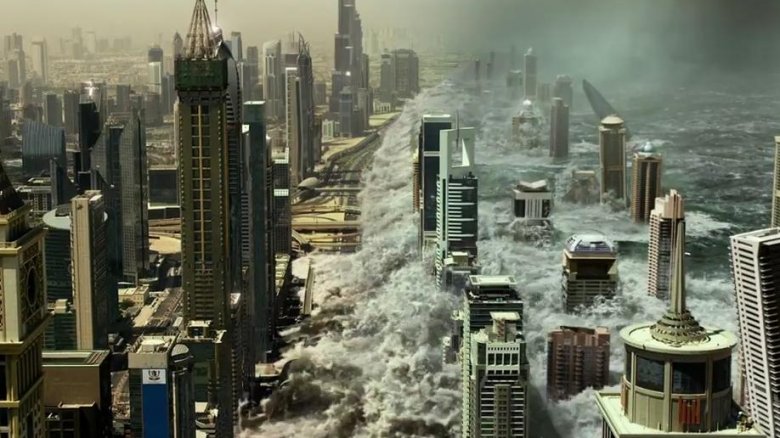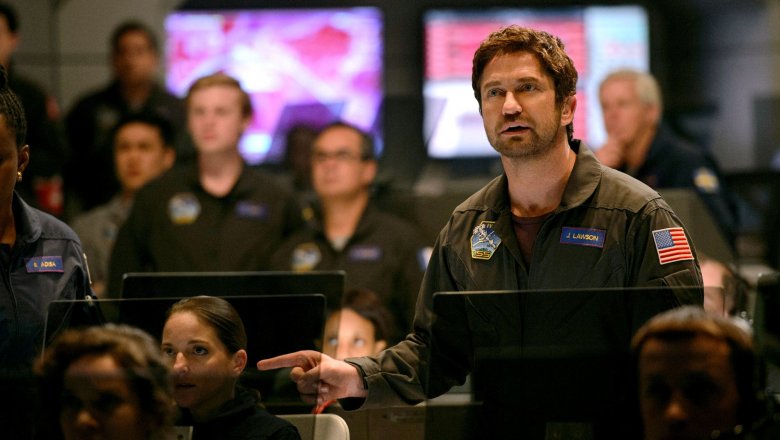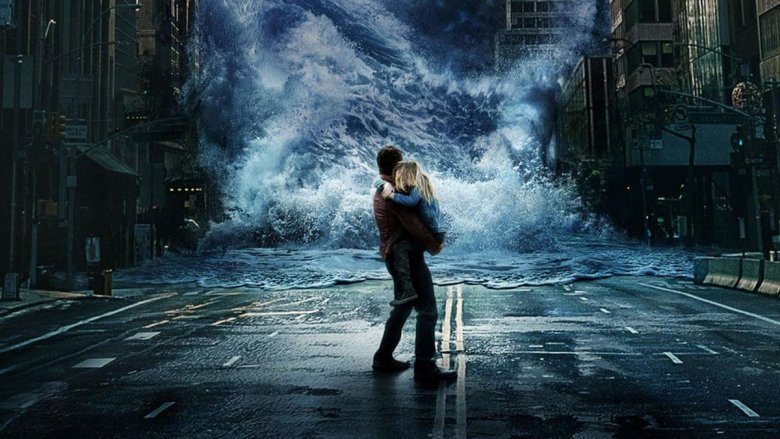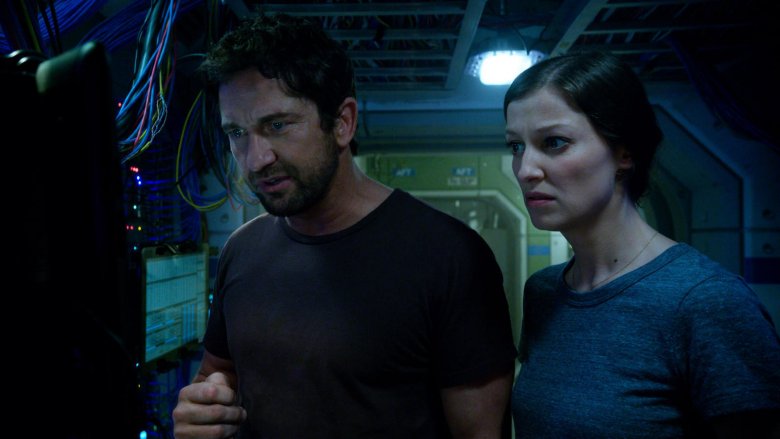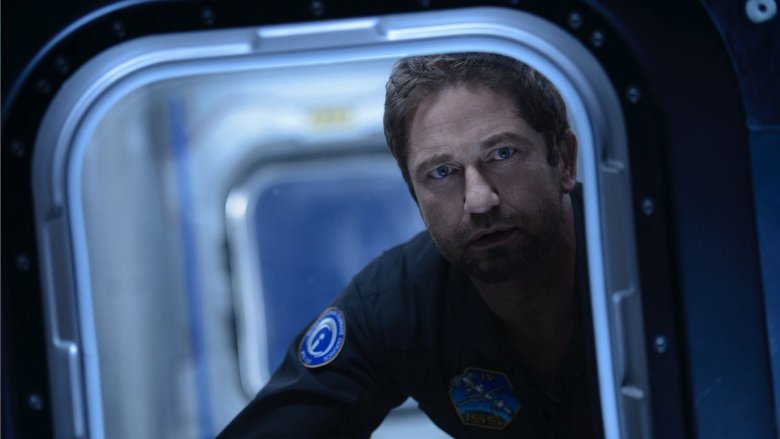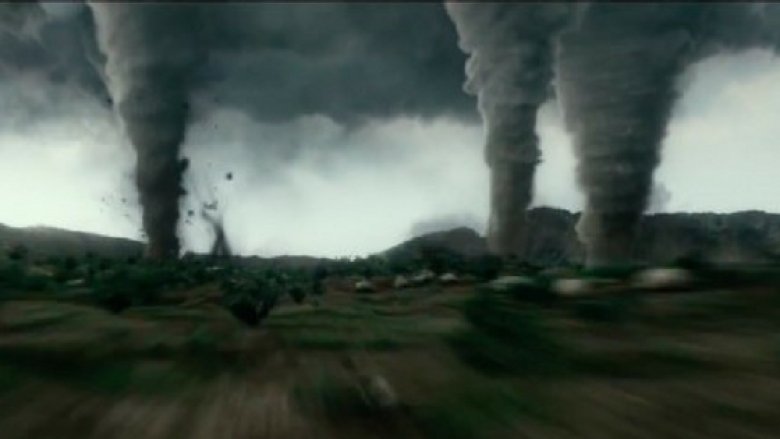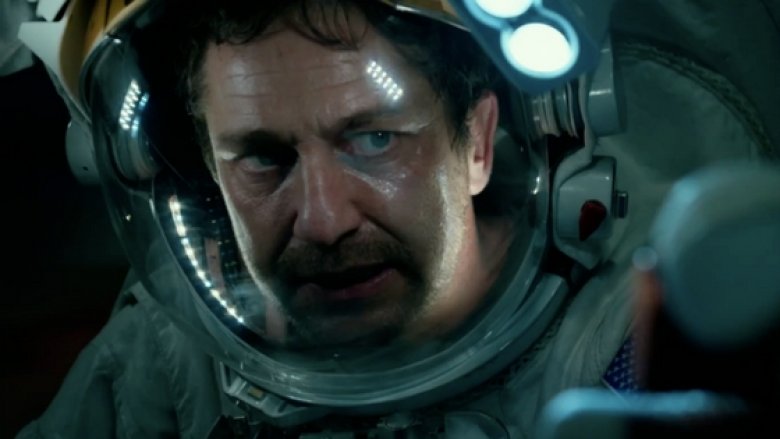The Real Reason Geostorm Flopped At The Box Office
Geostorm failed to find sunny skies at the box office over its opening weekend, pulling in just $13.3 million domestic against a reported budget of over $120 million. The disaster thriller, starring Gerard Butler as a scientist tasked with fixing satellites protecting the world from the catastrophic effects of climate change, was the latest in a string of big-budget flops in 2017, knocked down by a rocky production and a chilly reception from critics. Still, there's a lot more to what went wrong with Geostorm than just the obvious. Here are the real reasons why the film flopped at the box office.
It had a troubled road to the big screen
Geostorm took a long time to make its way to theaters. The movie was initially sold to Warner Bros. in 2014, with a release date set for March of 2016. However, that date would just be the first of several; its release was bumped to October of 2016, then January of 2017, and finally its eventual October of 2017 release.
A lot happened in the interim to hurt Geostorm's chances of success, including some production hurdles that drove up the cost—and generated bad word of mouth. Sources say that director Dean Devlin's first cut was "unwatchable," and despite weeks of post-production and numerous other test screenings, things didn't appear to get any better.
With Devlin's blessing, the studio brought on mega-producer Jerry Bruckheimer to oversee some $15 million in reshoots under director Danny Canon and screenwriter Laeta Kalogridis. The reshoots removed some characters, looking to better tie together the film's already existing VFX sequences in a way that made sense. Although reports say that the film tested much better after the edits, the added time and cost and the bad press that came with it didn't help.
An inexperienced director
Geostorm marked feature directorial debut for Dean Devlin, a veteran producer and screenwriter who's worked behind-the-scenes on movies like Independence Day, Godzilla, and Stargate. Devlin's extensive experience with big-budget disaster movies, as well as his experience directing shows like Leverage and The Librarians, suggested he was ready to helm his own effects-driven thriller, but reports suggest things went awry.
Sources say Devlin became overwhelmed with the movie's scale, and struggled to get it ready on time. Reportedly, he was also left mostly on his own, as production company Skydance Media was busy with other big-budget films. Without an experienced support system, Devlin reportedly struggled to realize his vision, resulting in the need for reshoots.
The end of the world is nothing new
Disaster movies have been done to death. Just in the years since Geostorm was pitched, we've seen Dwayne Johnson's San Andreas, the continuation of the Sharknado franchise, and more serious fare like Deepwater Horizon and War for the Planet of the Apes. On top of all of that, there are more anticipated upcoming films in the genre, like Pacific Rim: Uprising and the planned San Andreas sequel.
Shortly after selling Geostorm, Devlin crowded the field further when he set up the Independence Day sequel Resurgence, which premiered in 2016 to bad reviews while pulling in decent box office returns. Still, its fall from the original's high perch signified audience fatigue with disaster movies—something Geostorm's disappointing performance seems to confirm.
Bad social media buzz
The audience's disinterest in turning out for Geostorm was reflected in the movie's social media conversation. Analysts at RelishMix noted that most of the conversation about the film online was negative, with viewers comparing it to films like Armageddon, The Day After Tomorrow, and Independence Day.
Audiences have been getting more discerning recently about reboots and remakes, and even though Geostorm isn't officially based on a past property, the fact that the film draws so heavily on what's come before—without appearing to offer much that's new—was enough to keep audiences at home.
Critics hated it
Warner Bros. decided not to screen Geostorm for critics, and even held back on holding Thursday preview showings in most locations to try to protect the movie's potential for a Friday night haul. However, nothing could prevent the movie from eventually landing in the tough hands of critics, who absolutely tore it apart.
Geostorm currently sits at a dismal 13 percent on Rotten Tomatoes, with critics knocking the movie for being "big, dumb and boring" and suggesting that it "really could have used a Sharknado or two to liven things up." The few positive reviews of the movie mostly describe it as just adequate—not exactly a ringing endorsement.
Sometimes, audiences and critics diverge, especially on popcorn entertainment films, but here, that doesn't seem to be the case. Just 47 percent said they enjoyed the movie on Rotten Tomatoes' audience scoring system, while viewers awarded it with a B- CinemaScore. Although those figures could be much worse, none of it added up to a hit.
It's not bad enough to be fun
There's a level of bad where movies go from unwatchable to a whole lot of fun, like the early movies in the Sharknado franchise or John Travolta's over-the-top performance in Battlefield Earth. Geostorm, unfortunately, doesn't get to that level; instead of being so bad it's good, it's just a subpar—and disappointingly straight-ahead—would-be sci-fi action thriller. If the filmmakers had played up the premise's inherent ridiculousness a bit more, Geostorm might have been midnight-movie appointment viewing for audiences looking for a laugh. Instead, it seems destined to be quickly forgotten.
The marketing was a mess
Marketing plays a huge part in the chances of a movie's success, but if Geostorm's PR campaign telegraphed anything to viewers, it was the fact that the film was an absolute mess. This was mainly shown in the huge difference in tone between the film's first and second trailers.
The first Geostorm trailer was a somber affair, beginning quiet and eerie before kicking off with a "What a Wonderful World" cover underlying some pretty terrifying and deadly climate-related events. The second, though, was a lot more akin to a disaster comedy, using the same clips but with much more light-hearted music and some quips from Butler and his co-stars to make the typhoons and earthquakes seem more like a fun romp than a catastrophic, world ending event.
A lot of this probably came about thanks to the movie's extensive reshoots, but the fact that the two trailers were selling entirely different films wasn't a good sign when it came to pulling in an audience. Those looking for a serious disaster pic may have been turned off after seeing the second trailer, while those looking for something funnier may have wanted to stay away after seeing the first trailer.
It might be too reminiscent of real-life events
Geostorm was the victim of some pretty bad timing, arriving in theaters as the nation was still reeling from the effects of three devastating hurricanes, as well as deadly earthquakes in Mexico and catastrophic flooding around the globe. With so much disaster happening in real life, it's easy to understand why audiences might want to avoid seeing it on the big screen.
Geostorm's marketers recognized this, and pulled posters featuring the movie's old tagline, "Brave the Storm," replacing them with a new tagline reading "Control the Weather, Control the World."
However, that doesn't appear to have been enough, as the movie underperformed in regions that had been hit by the hurricanes. While there's some debate as to how much outside events effect a movie's box office performance, the fact that so much of the movie's plot was reminiscent of real life tragedies likely kept at least some viewers away.
Gerard Butler isn't a solid draw
There was a time when Gerard Butler's name could have reliably opened a big feature, but that time appears to have long gone. Since opening 300 to a massive $70.9 million domestic in 2007, Butler has been struggling to find his next hit, with his biggest profits coming from his voiceover role in the How to Train Your Dragon franchise.
Butler's box office bad luck kicked off with the 2011 biopic Machine Gun Preacher, which was made for $30 million but grossed just $3.3 million worldwide. Although he's seen moderate success with some rom-coms and with the actioners Olympus Has Fallen and London Has Fallen, he was also the face of the 2016 box office bomb Gods of Egypt—a massive flop domestically, pulling in just $31.2 million, but it did well overseas, bringing in an additional $119.6 million and allowing it to at least get close to recouping its massive budget. Geostorm now hopes to achieve similar results in non-U.S. markets, but once again, it looks like Butler's struggling to connect with audiences.
It couldn't stand up against its competition
Geostorm didn't face a massive amount of box office competition, but there was definitely enough out there that the movie had to do some work to grab viewers' attention. The film lost first place to the much lower-budget horror comedy Boo 2! A Madea Halloween, which nearly doubled its haul, but older releases may have had the most effect on its audience.
This includes Blade Runner 2049, which also struggled at the box office but was probably far more appealing to sci-fi or action fans. The horror movie Happy Death Day, also had far better reviews, while longtime mainstays like American Made, It, and Kingsman: The Golden Circle also pulled away viewers. While Geostorm didn't have to stand up against a huge box office juggernaut, a large number of smaller competitors pulled away much-needed attention.
Warner Bros. is relying on overseas profits
Like many a domestic flop, Geostorm will need to do very well overseas if it wants to avoid being a monumental failure for Warner Bros. Although the film is already off to an okay start with $49.6 million from 50 territories, estimates say the movie will need to bring in upwards of $300 million in order to break even.
Considering the fact that only about a quarter of the movie's profits in huge markets like China, where it has yet to open, will go back to the studio, things don't look good for Geostorm. Still, with Butler's name carrying more weight overseas and action-heavy fare tending to do better with international audiences, there's a chance that the worldwide box office can prevent the studio from taking a catastrophic loss.
